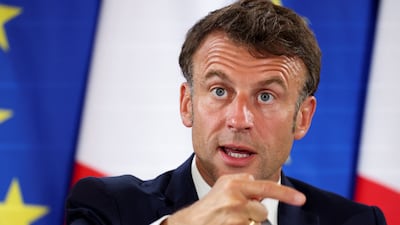Some progress was made on Monday in convincing some of France's EU allies to look at a more home-grown defence strategy, President Emmanuel Macron said, following Germany announced plans to jointly procure air defence systems from outside Europe.
In October, Germany announced a plan with 14 Nato allies to purchase systems that partly come from the US and Israel, in a drive to protect allied territory from missile attacks following Russia's invasion of Ukraine.
The move upset France and since then about 17 countries, including the Baltic states, Britain and several Eastern European powers that have traditionally turned to the US for military hardware, have signed up to the so-called European Sky Shield initiative.
After a defence meeting on the sidelines of the Paris Air Show, Mr Macron said that France, Belgium, Cyprus, Estonia and Hungary had signed a letter of intent for the joint purchase of the French Mistral air defence systems, built by missile producer MBDA.
“When we talk air defence, we would be wrong to rush into [increasing] capacity. The question is, first of all, strategic,” Mr Macron said at the meeting attended by about 20 countries.
“What Ukraine shows is that we can only give Kyiv what we have and produce. What comes from non-European countries is less manageable. It is subject to timetables, priorities and sometimes even authorisations from third countries.”
!['When we talk air defence, we would be wrong to rush into [increasing] capacity. The question is, first of all, strategic,' French President Emmanuel Macron said. EPA](https://www.thenationalnews.com/resizer/v2/U3MMWVFEJQZYGMUGRSXV42SC4M.jpg?smart=true&auth=8944d2b4dcb2eb7c6e38517bfd02c735e72a4310b8fa1af04be3185ab7dcef25&width=400&height=267)
Mr Macron said that in the long run, the EU needs to have its own strategic autonomy rather than relying specifically on the US through Nato.
Key to that would be building up the European defence industry and buying within the EU.
France is among the world's largest arms exporters.
Fearing an all-European solution could take decades, Berlin decided to go for proven off-the-shelf systems for Sky Shield, such as the US Patriot built by Raytheon, the Israeli Arrow 3 and the newer German Iris-T system.
Germany later left the door open for France to enter the group by adding the Franco-Italian-made Mamba system to the possible list of air defence systems available for Sky Shield members.
However, France has declined to join an initiative it believes creates new dependencies and the issue has turned into a bone of contention between Berlin and Paris.
A French defence official earlier said the discussion needed to go beyond air defence to look at threat analysis, the mix between defensive, offensive and anti-drone capabilities, and the nuclear umbrella.
In the Paris meeting, which came three days after a Nato defence ministers gathering, German Defence Minister Boris Pistorius defended Berlin's initiative, one source said.
A spokesman for the German defence ministry denied any competition between the German and French plans.
“The [European Sky Shield] initiative is no competition to Nato or the EU. Everything that is purchased can be integrated into the existing structure. This means that we are no competition to the French conference at Le Bourget,” he said.
“France and Spain obviously were invited to the (German-led) initiative. France took part in the first meetings. The initiative is open for additional countries that may want to join.”
Ukraine has acquired some Iris-Ts from Germany as it scrambles in the face of shortages to obtain as many western air defence units as it can to protect cities and critical infrastructure from Russian air strikes.
On Monday, Mr Macron said the Franco-Italian Mamba system was now deployed in Ukraine.
“It's Europe that protects Europe,” he said.


